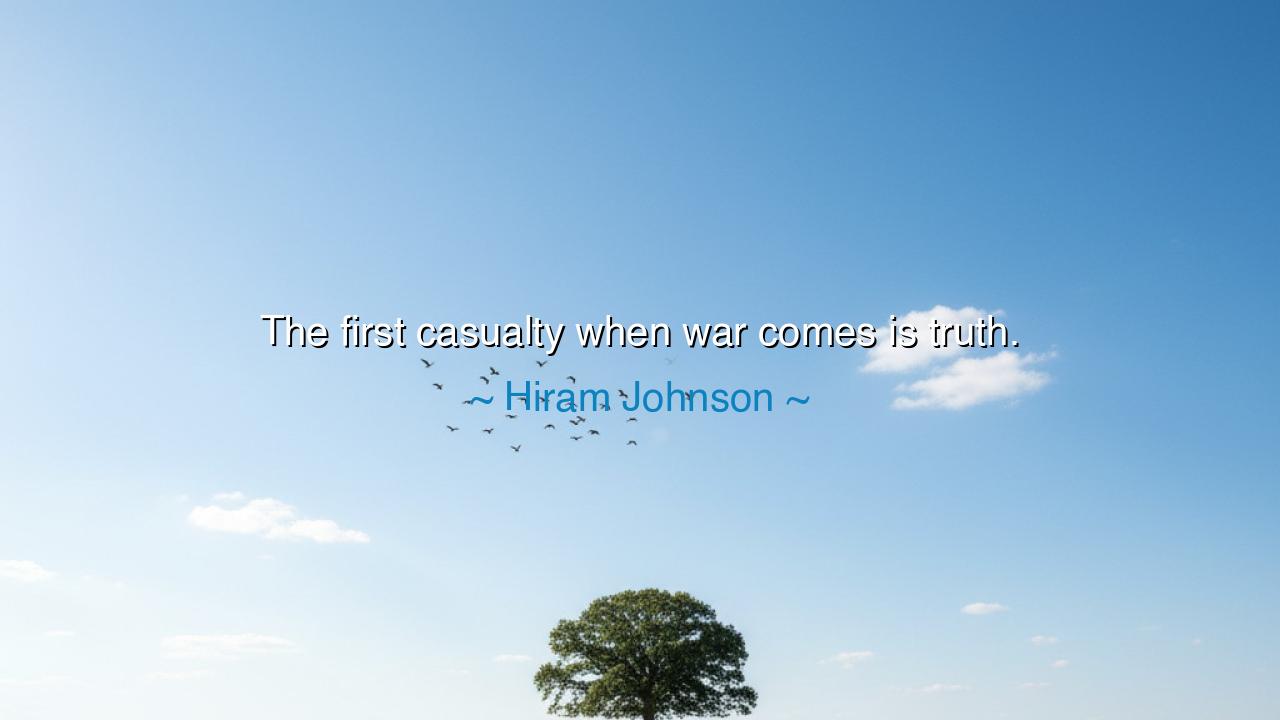
The first casualty when war comes is truth.






Hear the solemn warning of Hiram Johnson, spoken in 1917 as the world was engulfed in flames: “The first casualty when war comes is truth.” These words are not mere ornament, but a prophecy carved from history itself. For when the drums of war begin to beat, when nations call their people to arms, the first thing to fall is not a soldier, but truth. Lies take her place on the throne—lies of necessity, lies of glory, lies of hatred and fear. Truth, once silenced, is replaced by the banners of propaganda, and men march into slaughter not for reality, but for illusion.
The origin of this quote lies in Johnson’s opposition to America’s entry into the First World War. He saw clearly how governments twist language to stir the hearts of their people, how the horrors of battle are hidden beneath noble slogans, and how the enemy is painted monstrous so that killing him seems righteous. In such times, truth is an inconvenience, quickly buried beneath the cries of patriotism. The mother’s grief, the soldier’s broken body, the ruin of cities—all are hidden behind tales of honor and destiny. Thus, truth is the first to die, and only after her funeral do the bodies of men begin to fall.
The ancients too bore witness to this. Thucydides, chronicler of the Peloponnesian War, wrote that in times of war, words themselves change their meaning: what was once called cowardice is called prudence, what was once justice is mocked as weakness, and cruelty is renamed necessity. This is Johnson’s truth: that war corrupts not only the flesh but also the tongue, reshaping reality so that men believe they fight for gods and freedom, even while they destroy both.
Consider the story of the Gulf of Tonkin incident in 1964. A report claimed that American ships had been attacked by North Vietnamese forces, and this story was used to justify full-scale U.S. involvement in the Vietnam War. Later it was revealed that much of the report was false, exaggerated, or based on error. But by then, truth had already been slain, and countless lives were swept into the furnace of war. Here, history showed once again that the first casualty was not a soldier on the deck, but truth itself.
This wisdom applies not only to nations but to individuals. When conflict arises between families, between neighbors, between rivals, the first casualty is often truth. Exaggerations replace facts, motives are distorted, stories are twisted. Men and women wage wars of words as easily as wars of weapons, and truth is sacrificed so that pride may triumph. From the smallest quarrel to the greatest battle, falsehood paves the way for destruction.
The lesson, then, is heavy yet clear: in times of conflict, guard truth with all your strength. Question the words of leaders when they call for war. Examine your own heart when you are tempted to strike another with lies. Remember that falsehood is easier than truth in the heat of battle, but it is poison that lingers long after the swords are sheathed. Nations may survive war, but they are scarred forever if truth does not return.
Therefore, O child of tomorrow, hold fast to truth, even when the world demands falsehood. When war rages—whether among nations or within your own heart—do not let truth be the first to die. Speak it boldly, live it faithfully, and defend it fiercely. For though war may demand blood, only truth can bring peace when the smoke clears. Remember Johnson’s cry: “The first casualty when war comes is truth.” Let it not be so with you—let truth be the banner you carry, in times of peace and in times of strife, for only truth endures beyond the battlefield.






ANNgoc Anh Nguyen
This quote feels especially relevant in the age of information warfare and media manipulation. In modern conflicts, the battle for truth seems just as important as the physical battles. How do we protect the truth in an environment where misinformation is so easily spread? Is it possible to maintain an objective, truthful perspective during conflict, or are we always at the mercy of the narratives that control the information?
NLnguyen ngoc linh
The idea that truth is the first casualty in war makes me question how we perceive history. How often are the stories we hear about past wars influenced by the narratives of those who won? Can we ever be sure we know the full truth about historical events, or is the truth always subject to interpretation and manipulation by those in power? How do we deal with this uncertainty in our understanding of history?
PTPham T
Johnson’s quote brings to light the harsh reality that war often breeds lies and deceit. It’s a powerful reminder of how the fog of war can obscure the facts. In times of conflict, is the manipulation of truth always a tool for gaining power, or do both sides distort the truth to justify their actions? How do we, as individuals, navigate this distorted reality during times of war or political unrest?
HVHa Vann
This quote is chilling in how it highlights the dangers of losing truth in the chaos of war. When truth becomes the first casualty, it makes me think about the long-term consequences of such manipulation. How do societies recover from the destruction of truth after a conflict? Is it possible to restore trust once truth has been compromised, or does the damage linger long after the war is over?
GNTruc Giang Nguyen
Hiram Johnson’s quote really makes me reflect on how war distorts reality. The idea that truth is the first casualty when conflict arises speaks to the manipulation of information in times of crisis. How often do governments or other powers control the narrative during war to sway public opinion or suppress dissent? Do you think we can ever fully trust the information we receive during wartime, or is deception inevitable?